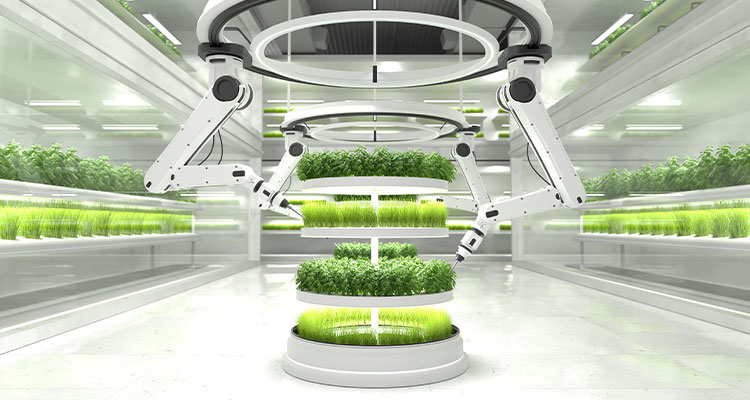
With the UK food industry facing significant challenges, is AI the answer?
According to a recent report by the Institute of Grocery Distribution (IGD), the UK food industry risks collapse in light of recent pressures, including rising global demand combined with domestic pressures, such as increasing labor costs and persistent workforce shortages.
With the food supply chain being an integral part of both the economy and critical national infrastructure, it is imperative that these challenges are addressed. However, effectively creating solutions to these challenges requires more than just incremental operational improvements. It is high time that the industry embraces advanced technological solutions and an overhaul of operations.

With the emergence of artificial intelligence (AI), automation, and advanced agentic systems revolutionizing a variety of sectors, the food manufacturing sector specifically stands to benefit from these technologies, which offer capabilities that go far beyond those of conventional machinery.
How will AI become the solution?
There are many facets to food manufacturing that require intervention. From optimizing supply chains and reducing food waste, each stage requires oversight and continuous improvement. AI offers a multifaceted solution to these challenges, providing targeted support at each stage of the food manufacturing process.
For example, AI can create a system where waste is minimized, quality is consistently prioritized, and production processes run seamlessly. This is done through intelligence driven visual inspection technologies which provide precise and continuous quality checks that go beyond human capabilities. Furthermore, these systems have the ability to strengthen operational resilience by continuously adapting to disruptions, such as supplier delays or shifts in consumer demand. These systems can also optimize numerous operational areas, including supply chain logistics, energy management, and detailed production scheduling.
There are also subfields of artificial intelligence, each offering specialized solutions based on its unique capabilities. For instance, advanced agentic AI systems autonomously adjust operations within specified parameters, consistently maintaining optimal performance.
Meanwhile, robotics and automation ensure precision and consistency in factory tasks such as mixing, portioning, packaging, and inspection, significantly reducing variability and enhancing food safety.
Overall, with there being many factors within the food manufacturing industry requiring attention, a multi-faceted approach is needed to address these issues.
Sustainable growth in production – the robotics approach
To meet the rising global demand for food, it is essential for the industry to embrace robotics and automation. These technologies efficiently manage repetitive and physically demanding tasks, such as lifting heavy items, packaging products, and performing cleaning duties, thereby decreasing dependence on manual labor.
Robotic units have the ability to ‘swarm intelligence’, meaning, they are able to flexibly coordinate tasks, rapidly adjusting to evolving conditions. Additionally, advanced analytics boost predictive capabilities, anticipating equipment failures and optimizing logistics to minimize downtime and reduce waste.
These systems enable continuous, high-speed production while improving overall throughput and efficiency. At the same time, AI algorithms play a critical role in resource management, controlling the use of materials, water, and energy to minimize waste and boost productivity.
In supply chain management, robotics is also able to bring a proactive approach to logistics, helping to identify and resolve bottlenecks, optimize delivery routes, and respond swiftly to disruptions. Innovations such as mobile automated manufacturing units further enhance flexibility, allowing for localized production that adapts to shifting demands.
A new wave of AI – how agentic models can help 
As AI further develops, new strains of this technology enter the technological sphere, providing unique, intelligent solutions to problems. The most recent of these is agentic AI.
Advanced agentic AI systems autonomously manage extensive operational segments, enabling more streamlined workforce structures. This allows human workers to concentrate on strategic oversight, compliance, and stakeholder engagement.
AI acts as a productivity “co-pilot,” enhancing human decision making and enabling skilled personnel to manage complex tasks more effectively. These systems are capable of swiftly learning new functions to reduce training requirements and flexibly address labor shortages.
Strategic integration for success
A technological overhaul, while often positioned as the ‘perfect’ solution, still requires a strategic integration to ensure these innovations are implemented effectively and deliver meaningful results. This approach can be clearly defined in the following ways.
Well-defined oversight structures that explicitly outline operational objectives, and rigorous safety and ethical standards must precede AI deployment. These include robust safety protocols, like physical safeguards, engineering redundancies, and cybersecurity measures, all of which are essential alongside meaningful human oversight and emergency intervention capabilities.
It is also imperative that these systems undergo rigorous validation through realistic testing scenarios prior to deployment.
Taking a gradual approach to implementation, starting with low-risk applications and scaling up as confidence grows, is the most effective strategy. Transparency and accountability are essential when deploying AI solutions, as they help maintain trust and support effective troubleshooting.
Finally, it is imperative to consider the human side of the co-pilot relationship. Through robust workforce training and active engagement, employees can develop the skills needed to collaborate effectively with technology, ensuring that human insight and machine intelligence work together seamlessly, leading to better outcomes.
An additional benefit in prioritizing human and AI collaboration is that by investing in AI literacy and skills, developments can also address employment concerns and job evolution proactively.
The future of food manufacturing
By responsibly integrating intelligent solutions, the UK food industry can appropriately and comprehensively address the significant issues that it faces. While not a complete solution, it should, at the very least, improve the efficiency, resilience, quality, and sustainability of all aspects of the food system.
If the UK is to keep pace with other nations and economic blocs, the time for embracing innovation is now.
Eleanor ‘Nell’ Watson
Eleanor ‘Nell’ Watson is an IEEE member and AI ethics engineer and in the AI Faculty at Singularity University. Author of ‘Taming the Machine: AI’, Eleanor works principally as a machine intelligence researcher and serves as Chair & Vice-Chair respectively of the IEEE’s ECPAIS Transparency Experts Focus Group, and P7001 Transparency of Autonomous Systems committee on A.I. Ethics & Safety, engineering mechanisms into A.I. to help safeguard algorithmic trust. She holds the position of Executive Consultant on philosophical matters for Apple, as well as the President of EURAIO, the European Responsible Artificial Intelligence Office. She was one of the first signatories for the Future of Life Institute’s Open Letter on AI.
